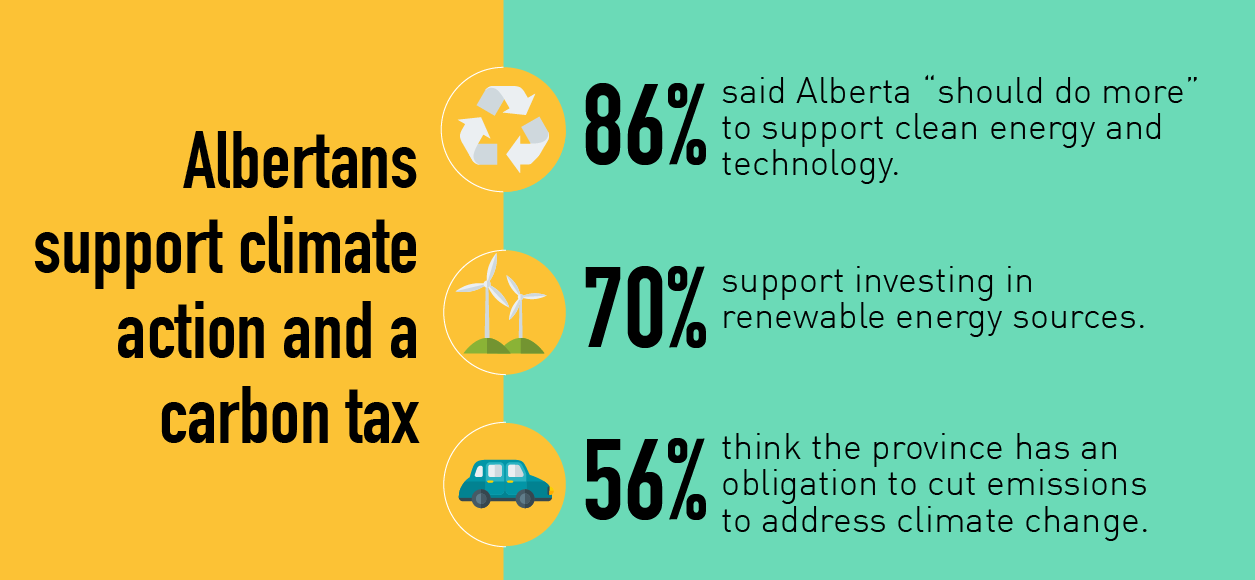 Congratulations to the Pembina Institute on a poll they conducted with EKOS Research, assessing support for climate action among Albertans.
Congratulations to the Pembina Institute on a poll they conducted with EKOS Research, assessing support for climate action among Albertans.
The results are fascinating and hopeful. For a good post media summary, see this Vancouver Sun article.
A few highlights:
<li>A large majority of respondents (70%) support investing in renewable energy sources to reduce the province’s reliance on coal-fired electricity.</li>
<li>A majority (56%) of Albertans think the province has an obligation to cut emissions to address climate change, while only 26% disagree.</li>
<li>53% of those polled said they support stronger climate change policies, even if they mean higher costs for oilsands producers.</li>
More interesting still: 50% of those polled supported an economy-wide carbon tax (such as exists in BC) as opposed to an Alberta-style levy that applies only to greenhouse-gas producing industries. 38% are opposed to such a tax. But perhaps most interesting is this: support for an economy-wide carbon tax rises to 72% when the revenue raised is directed towards infrastructure and community projects to reduce carbon emissions, and rises to 60% when the money raised is used to protect low-income households from increased energy prices. In contrast, using the money raised to lower personal income taxes does nothing to increase support for a carbon tax.
These latter findings correspond with what we at CCPA have said for years. Namely, making carbon taxes “revenue-neutral” (ploughing all the money raised into various tax cuts, as BC does) makes no sense. It’s a poor use of resources, and a lost opportunity to take climate action and restore tax fairness – and the public gets it!
 These findings also offer an important lesson for the next federal government, and point to some strengths and weaknesses of the NDP versus Green Party approaches to carbon pricing.
These findings also offer an important lesson for the next federal government, and point to some strengths and weaknesses of the NDP versus Green Party approaches to carbon pricing.
The NDP’s “cap-and-trade” plan would set specific emission limits (a cap) for industrial emitters, and then would make industry pay for the GHGs they produce. The money raised would not be used to lower taxes, but would go to the provinces to be spent on climate action investments. The NDP has chosen to pass on the traditional (and cynical) “revenue-neutral” approach.
The Green Party’s “fee and dividend” plan would include an economy-wide $30/tonne carbon tax (which the public supports), but then takes all the money raised and gives it back in an equal tax-cut to all adults (which Albertans indicate they view as a poor use of the revenues raised).
The Liberals have not proposed a specific carbon-pricing plan, but say they will work with the provinces to establish national emission-reduction targets and “ensure that the provinces and territories have adequate tools to design their own policies to meet these commitments, including their own carbon pricing policies.”
The Conservatives have rejected carbon pricing outright, instead stating a preference for a regulatory approach. But thus far, as Marc Lee notes in this recent post, the government’s success using this method leaves much to be desired. While GHG emissions fell during the economic downturn in 2008 and 2009, they have increased every year since (going up to 2013, the last year for which we have data). And after years of promises, the government has yet to propose a GHG regulatory regime for Canada’s oil and gas sector.
Hopefully the next government will move toward with a vigorous economy-wide carbon pricing plan, tied to legislated GHG emission reduction targets, and will use revenues raised to help get the job done. If the public in Alberta is ready, surely the rest of Canada is too.
Seth Klein is Director of CCPA’s BC Office. Follow Seth on Twitter @SethDKlein.






